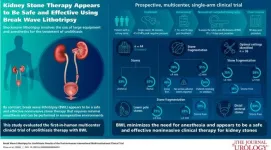(Press-News.org) New findings from McGill University researchers could help clinicians understand the course of delusions in youth and young adults that signal the need for a timely intervention to prevent a full relapse of psychosis.
Delusions — strong beliefs that don't align with commonly accepted reality— are a defining symptom of psychosis but are not sufficiently understood.
For the first time, researchers studied whether delusion themes, such as paranoia or grandiosity, stay the same or shift between psychotic episodes in youth and young adults undergoing early intervention treatment.
The importance of timely treatment
Notably, most patients did not relapse at all following their first episode, showing the efficacy of early intervention and highlighting the need for improved access, said the researchers. An estimated 75 per cent of children with mental disorders do not use specialized treatment services, according to Youth Mental Health Canada.
“Early intervention is essential if we want to give young people the best chance at lasting recovery,” said lead author Gil Grunfeld, a recent master’s graduate from McGill’s Department of Psychiatry and a current doctoral student at Boston University.
Detecting patterns in delusions
The study, published in Jama Psychiatry, found that in the less likely instances of relapse, patients almost always had the same type of delusion as their first episode.
“The return of similar narratives potentially suggests the mind may be reflecting the same patterns seen in earlier episodes,” said Grunfeld.
“Recognizing this pattern of delusions in those who go on to relapse could help clinicians understand the experience of their patients and adjust the care they provide,” said Dr. Jai Shah, an Associate Professor in McGill’s Department of Psychiatry and a researcher at the Douglas Hospital Research Centre.
Delusions often persisted even as other symptoms improved, suggesting delusions may require different treatment strategies, he added.
“Delusions are often highly distressing and difficult to define, which makes closing the gap in research all the more crucial. There is a great deal of future work to be done,” said Grunfeld.
The researchers followed about 600 patients ages 14 to 35 for up to two years. All were receiving treatment at an early-intervention service for psychosis in Montreal.
The study was funded by the Fonds de Recherche du Québec-Santé, the Canadian Institutes of Health Research, the Canada Research Chairs program and the McGill University Faculty of Medicine and Health Sciences.
END
New insights could help prevent psychosis relapses in youth and young adults
First-of-its-kind study involving Montreal treatment center addresses gap in research on psychosis relapses
2024-09-11
ELSE PRESS RELEASES FROM THIS DATE:
Biogeochemistry scientists from around the world, led by the ASC's Margenot, publish position paper on tackling “hidden” phosphorus
2024-09-11
As the world tries to mitigate agriculture’s effect on the environment, much of the story can be found in the soils, which stores and cycles nutrient elements of carbon, nitrogen, and phosphorus. Biogeochemistssuch as Andrew Margenot, Associate Director of the Agroecosystem Sustainability Center, are set to find answers, but for Margenot and other biogeochemistry experts who specialize in studying phosphorus cycling, the challenge is first being able to accurately measure where phosphorus has accumulated in the <100 years since humans began to increase ...
New, rare type of small cell lung cancer identified by MSK research team
2024-09-11
A team of doctors and researchers at Memorial Sloan Kettering Cancer Center (MSK) have identified a new, rare type of small cell lung cancer that primarily affects younger people who have never smoked.
Their findings, which include a detailed analysis of the clinical and genetic features of the disease, also highlight vulnerabilities that could help doctors make better treatment decisions for people diagnosed with it.
“It’s not every day you identify a new subtype of cancer,” says Natasha Rekhtman, MD, PhD, an MSK pathologist specializing in lung cancer and the first author of a paper published August 26 in Cancer Discovery presenting ...
Light pollution a new Alzheimer’s risk factor
2024-09-11
Outdoor light at night could be a significant risk factor in Alzheimer’s disease, according to new research from Rush.
While light pollution is associated with increased risk of some disorders and diseases, this is the first time it had been associated with Alzheimer’s disease.
The study was conducted at Rush University System for Health and published in Frontiers in Neuroscience.
“Our research shows that there is an association in the U.S. between Alzheimer’s disease prevalence and exposure to light at night, particularly in those under the age of 65,” said lead investigator, Robin Voigt-Zuwala, PhD, an associate professor at Rush. “Nightly ...
Clovis people used Great Lakes camp annually 13,000 years ago
2024-09-11
Graphics // Photos
The earliest humans to settle the Great Lakes region likely returned to a campsite in southwest Michigan for several years in a row, according to a University of Michigan study.
Until recently, there was no evidence that people from the Clovis period had settled the Great Lakes region. Clovis people appeared in North America about 13,000 years ago, during the geologic epoch called the Pleistocene. During the Pleistocene, sheets of glaciers covered much of the world, including Michigan, making the land inhospitable for human settlers. But a 2021 U-M study confirmed that Clovis people built ...
Can having a stroke change your sleep?
2024-09-11
EMBARGOED FOR RELEASE UNTIL 4 P.M. ET, WEDNESDAY, SEPTEMBER 11, 2024
MINNEAPOLIS – People who have had a stroke may be more likely to sleep too much or too little compared to those without prior stroke, according to a study published in the September 11, 2024, online issue of Neurology®, the medical journal of the American Academy of Neurology. The study does not prove that stroke causes abnormal sleep; it only shows an association.
“Sleeping the right amount is considered essential for ideal brain and heart health,” said study author Sara Hassani, ...
Microscale robot folds into 3D shapes and crawls
2024-09-11
ITHACA, N.Y. – Cornell University researchers have created microscale robots less than 1 millimeter in size that are printed as a 2D hexagonal “metasheet” but, with a jolt of electricity, morph into preprogrammed 3D shapes and crawl.
The robot’s versatility is due to a novel design based on kirigami, a cousin of origami, in which slices in the material enable it to fold, expand and locomote.
The team’s paper, “Electronically Configurable Microscopic Metasheet Robots,” published Sept. 11 in Nature Materials. The paper’s co-lead authors are postdoctoral ...
New noninvasive technique provides effective treatment for urinary stones
2024-09-11
September 11, 2024 — A noninvasive ultrasound technology called Break Wave™ lithotripsy (BWL) offers a safe and effective new option for treatment of urinary stones, reports a clinical trial in the October issue of The Journal of Urology®, an Official Journal of the American Urological Association (AUA). The journal is published in the Lippincott portfolio by Wolters Kluwer.
"In this initial experience, BWL provided a high treatment success rate, using a portable technology that can be used in a range of settings, without the need for anesthesia" comments lead ...
Researchers uncover new infection-fighting molecules through “molecular de-extinction”
2024-09-11
A new study led by Cesar de la Fuente, PhD, Presidential Assistant Professor of Psychiatry, Microbiology, Chemistry, Chemical and Biomolecular Engineering, and Bioengineering at the University of Pennsylvania, has uncovered sequences for infection-fighting molecules in the genomic data of extinct species. This most recent study in the emerging field of “molecular de-extinction”, pioneered by Prof. de la Fuente, offers the potential to develop new antimicrobial treatments in the fight against rising antibiotic resistance.
The study, published in Cell Reports Physical Science, analyzed genomic data from the extinct moa, a flightless bird from New Zealand, ...
Keeping mold out of future space stations
2024-09-11
COLUMBUS, Ohio – Mold can survive the harshest of environments, so to stop harmful spores from growing on future space stations, a new study suggests a novel way to prevent its spread.
Researchers created a predictive approach for modeling unintended microbial growth in critical spaces and applied it to life on the International Space Station.
An analysis of dust samples obtained from the space station found that repeated elevated humidity exposures for even a short time can lead to rapid microbial growth and composition changes in dust that make it easier for microbes, ...
"It feels like I'm moving my own hand". A research team from the Scuola Superiore Sant'Anna in Pisa has developed the prosthesis of the future, the first in the world with magnetic control
2024-09-11
Pisa, 11 september. It is the first magnetically controlled prosthetic hand, that allows amputees to reproduce all movements simply by thinking and to control the force applied when grasping fragile objects. No wires, no electrical connection, only magnets and muscles to control the movements of the fingers and enable everyday activities such as opening a jar, using a screwdriver, picking up a coin.
A research team from the BioRobotics Institute of the Scuola Superiore Sant'Anna in Pisa, coordinated by Prof. Christian Cipriani, has ...
LAST 30 PRESS RELEASES:
New knowledge on heritability paves the way for better treatment of people with chronic inflammatory bowel disease
Under the Lens: Microbiologists Nicola Holden and Gil Domingue weigh in on the raw milk debate
Science reveals why you can’t resist a snack – even when you’re full
Kidney cancer study finds belzutifan plus pembrolizumab post-surgery helps patients at high risk for relapse stay cancer-free longer
Alkali cation effects in electrochemical carbon dioxide reduction
Test platforms for charging wireless cars now fit on a bench
$3 million NIH grant funds national study of Medicare Advantage’s benefit expansion into social supports
Amplified Sciences achieves CAP accreditation for cutting-edge diagnostic lab
Fred Hutch announces 12 recipients of the annual Harold M. Weintraub Graduate Student Award
Native forest litter helps rebuild soil life in post-mining landscapes
Mountain soils in arid regions may emit more greenhouse gas as climate shifts, new study finds
Pairing biochar with other soil amendments could unlock stronger gains in soil health
Why do we get a skip in our step when we’re happy? Thank dopamine
UC Irvine scientists uncover cellular mechanism behind muscle repair
Platform to map living brain noninvasively takes next big step
Stress-testing the Cascadia Subduction Zone reveals variability that could impact how earthquakes spread
We may be underestimating the true carbon cost of northern wildfires
Blood test predicts which bladder cancer patients may safely skip surgery
Kennesaw State's Vijay Anand honored as National Academy of Inventors Senior Member
Recovery from whaling reveals the role of age in Humpback reproduction
Can the canny tick help prevent disease like MS and cancer?
Newcomer children show lower rates of emergency department use for non‑urgent conditions, study finds
Cognitive and neuropsychiatric function in former American football players
From trash to climate tech: rubber gloves find new life as carbon capturers materials
A step towards needed treatments for hantaviruses in new molecular map
Boys are more motivated, while girls are more compassionate?
Study identifies opposing roles for IL6 and IL6R in long-term mortality
AI accurately spots medical disorder from privacy-conscious hand images
Transient Pauli blocking for broadband ultrafast optical switching
Political polarization can spur CO2 emissions, stymie climate action
[Press-News.org] New insights could help prevent psychosis relapses in youth and young adultsFirst-of-its-kind study involving Montreal treatment center addresses gap in research on psychosis relapses


